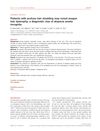 10 citations,
January 2007 in “Dermatologic Surgery”
10 citations,
January 2007 in “Dermatologic Surgery” Artificial hair fibers help treat scalp scars with few complications and a 20% yearly fiber fall rate.
 8 citations,
January 1989 in “Annual Reports in Medicinal Chemistry”
8 citations,
January 1989 in “Annual Reports in Medicinal Chemistry” Hair loss from alopecia areata and androgenetic alopecia can be treated, but more effective and safer treatments are needed.
 4 citations,
July 2008 in “British journal of dermatology/British journal of dermatology, Supplement”
4 citations,
July 2008 in “British journal of dermatology/British journal of dermatology, Supplement” Poor response to topical immunotherapy in alopecia areata patients is linked to impaired cell responses.
 August 2019 in “International journal of current microbiology and applied sciences”
August 2019 in “International journal of current microbiology and applied sciences” Young dogs in Odisha with dermatitis are most often infected by Microsporum fungus, and Miconazole is the most effective treatment.
 September 1997 in “JEADV. Journal of the European Academy of Dermatology and Venereology/Journal of the European Academy of Dermatology and Venereology”
September 1997 in “JEADV. Journal of the European Academy of Dermatology and Venereology/Journal of the European Academy of Dermatology and Venereology” Blocking IL-1 could help treat some hair loss conditions; alopecia affects liver detox systems; spironolactone is better than finasteride for female hair growth; focusing on the catagen hair phase could lead to new alopecia treatments.
 January 2007 in “Dermatologic Surgery”
January 2007 in “Dermatologic Surgery” Artificial hair fibers help treat scalp scars with few complications and a 20% yearly fiber fall rate.
 January 2014 in “Springer eBooks”
January 2014 in “Springer eBooks” The document's conclusion cannot be determined from the provided text.
 August 2021 in “EMC - AKOS - Trattato di Medicina”
August 2021 in “EMC - AKOS - Trattato di Medicina” Acquired alopecia is hair loss that can be reversible or irreversible, depending on whether the hair follicle is destroyed.
January 1989 in “Springer eBooks” 2 citations,
January 1986 in “PubMed” Spironolactone improved symptoms in women with hormonal imbalances and had few side effects.
30 citations,
October 2020 in “Frontiers in Plant Science” Combined arsenic and low oxygen stress alters root growth to help plants absorb nutrients.
17 citations,
June 2020 in “Anais brasileiros de dermatologia/Anais Brasileiros de Dermatologia” Scalp cooling is an effective way to prevent hair loss from chemotherapy.
 1 citations,
July 2023 in “F&S Reviews”
1 citations,
July 2023 in “F&S Reviews” Some common medications may harm male fertility by affecting hormones, sperm production, and sexual function.
1 citations,
August 2005 in “Springer eBooks” Alopecia areata is an autoimmune disease with genetic links, treatable with certain medications, and can affect mental health.

Collagen VI is crucial for nerve function and affects wound-induced hair regrowth.
 258 citations,
July 2016 in “Reproductive Biology and Endocrinology”
258 citations,
July 2016 in “Reproductive Biology and Endocrinology” The document concludes that insulin resistance is key in PCOS development and early treatment is crucial to prevent complications.
 31 citations,
October 2010 in “Journal of the European Academy of Dermatology and Venereology”
31 citations,
October 2010 in “Journal of the European Academy of Dermatology and Venereology” Some people with heavy hair shedding might actually have a hidden form of alopecia, which can be identified by specific hair changes.
8 citations,
July 2020 in “BMC genomics” The research found genes that change during cashmere goat hair growth and could help determine the best time to harvest cashmere.
 9 citations,
November 2013 in “Presse Medicale”
9 citations,
November 2013 in “Presse Medicale” The document concludes that managing female hyperandrogenism requires a combination of identifying the cause, lifestyle changes, medication, and cosmetic treatments.
 August 2023 in “American Journal of Hospice and Palliative Medicine”
August 2023 in “American Journal of Hospice and Palliative Medicine” People in palliative care often have skin problems due to their main illness or other health issues, and treatments focus on comfort and quality of life.
 31 citations,
June 2011 in “Movement Disorders”
31 citations,
June 2011 in “Movement Disorders” The document describes a woman with familial Parkinson's disease due to a genetic mutation, showing severe symptoms and poor response to treatment, and suggests finasteride may help reduce symptoms in Tourette syndrome.
 April 2023 in “Journal of Investigative Dermatology”
April 2023 in “Journal of Investigative Dermatology” LSD1 is essential for healthy skin development and creating the skin's protective barrier.
May 2022 in “The journal of investigative dermatology/Journal of investigative dermatology” Loss of TET2 increases the risk of skin and oral cancer.
 88 citations,
October 2002 in “Journal of Dermatology”
88 citations,
October 2002 in “Journal of Dermatology” Finasteride for hair loss may cause depression, affecting sleep and relationships.
 November 2003 in “Journal of Dermatology”
November 2003 in “Journal of Dermatology” Authors defend finasteride-depression link, suggest detailed medical history, and call for more investigation.
 14 citations,
November 2011 in “Journal of The American Academy of Dermatology”
14 citations,
November 2011 in “Journal of The American Academy of Dermatology” Alopecia Areata Incognita causes widespread hair thinning, and treatment with systemic corticosteroids and psychiatric support can lead to remission.
 7 citations,
January 2014 in “Case reports in endocrinology”
7 citations,
January 2014 in “Case reports in endocrinology” A woman's excessive hair growth was caused by a rare benign tumor in her adrenal gland, which was successfully removed.
 November 2003 in “Journal of Dermatology”
November 2003 in “Journal of Dermatology” Finasteride's link to depression is questionable due to study flaws and potential bias.
 223 citations,
December 2010 in “The Journal of Sexual Medicine”
223 citations,
December 2010 in “The Journal of Sexual Medicine” Some patients taking finasteride or dutasteride may have ongoing sexual problems and depression even after stopping the medication.
 137 citations,
March 2006 in “Cns Drug Reviews”
137 citations,
March 2006 in “Cns Drug Reviews” Finasteride treats enlarged prostate and hair loss, but may cause side effects in some patients.























